The US economy seems strong after a year of Trump, but is it really?
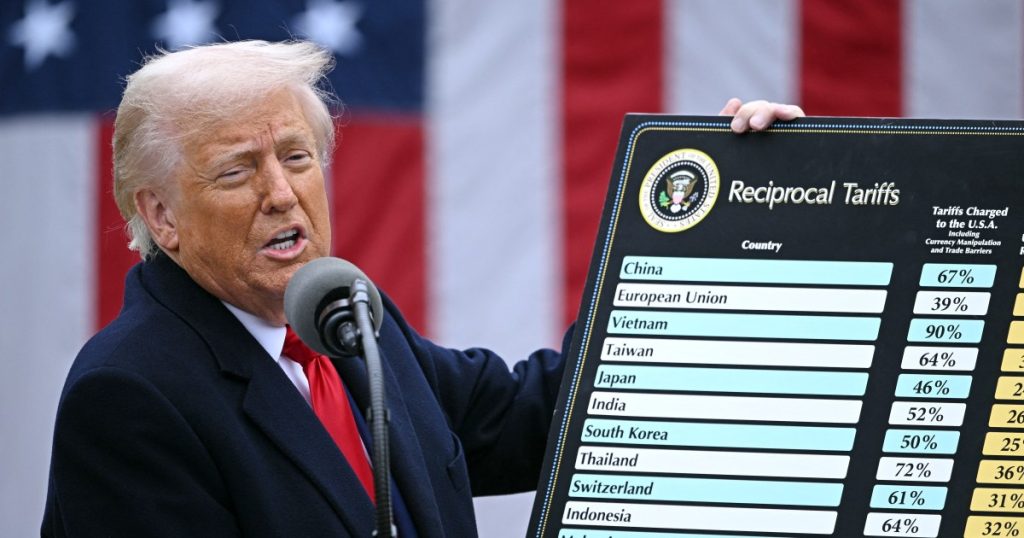
Over the past year, United States President Donald Trump has unleashed a slew of policies that have upended businesses, supply chains and jobs. Yet the US economy seems to be growing at a healthy clip, and the unemployment rate is in a safe zone. Recommended Stories list of 4 itemsend of list The reality, experts say, is that the stock market boom has helped to mask deeper underlying problems in the economy. Since taking office, Trump has imposed a range of tariffs on countries, including key trading partners, leading to predictions of inflation skyrocketing, manufacturing screeching to a halt and unemployment soaring. None of those scenarios came true. Inflation, while above the Federal Reserve’s target, was a modest 2.7 percent in December. The unemployment rate was relatively low, at 4.4 percent, last month. Gross domestic product (GDP) grew at 4.3 percent in the third quarter of 2025, the fastest in two years. “The shock and awe we anticipated just didn’t materialise,” Bernard Yaros, lead US economist at Oxford Economics, told Al Jazeera. Yaros said the limited fallout could be attributed to the relative lack of retaliation by other countries and the stock market rally that quickly followed Trump’s dialling back of the steepest tariffs announced on “liberation day“. Since Trump’s April 2 announcement, the stock market, which is heavily weighted towards the “magnificent seven” tech companies, has risen nearly 30 percent, boosting Americans’ paper wealth and encouraging households to loosen their purse strings. Gains in net wealth have driven almost one-third of the rise in consumer spending since the COVID-19 pandemic, Oxford Economics said in a research briefing in October. Advertisement At the same time, the gains have not been distributed evenly. The top 10 percent of earners are now estimated to account for roughly half of all spending, the highest proportion since officials began compiling data in 1989, according to Moody’s Analytics. “The gains are going a lot to people in higher income brackets – they are the ones who have the stock portfolios – and are going to people in sectors and occupations tied to AI,” Marcus Noland, executive vice president of the Peterson Institute for International Economics, told Al Jazeera. “But, these numbers mask the unevenness in the growth in this economy.” Net decline of workers A careful parsing of the data reveals that unevenness. For instance, despite the impressive GDP numbers, that growth is not being accompanied by an increase in hiring. While hospitality and healthcare added workers last year, retail, manufacturing and construction – sectors that rely heavily on migrants – all shed jobs. As a result of the Trump administration’s mass deportation of undocumented immigrants and tightening of legal migration pathways, the US last year experienced negative net migration for the first time in at least half a century, according to a Brookings Institution analysis. “And through this very public and brutal way of going about deportations, they have discouraged illegal immigration, but also intimidated immigrants in the US,” Noland said, adding that the US workforce is projected to see a net decline of two million workers this year. The “bifurcation” in the US economy is also being felt across the business world, with smaller companies lacking the deep pockets to stockpile inventories or negotiate with suppliers in the face of increased tariffs. “The surge in policy uncertainty this year has had an outsize effect on smaller firms,” Oxford Economics said in a November report. These firms are also seeing little benefit from the boom in the artificial intelligence (AI) industry since revenues have been driven by capital-intensive chip manufacturing and cloud services. While AI proponents believe the world is on the cusp of huge gains in productivity that could dramatically raise living standards, there are concerns about large numbers of people being put out of work. “This could be the new norm – jobless growth. That’s one reason people are not feeling so great,” Yaros said. “While a lot of hype about AI and productivity benefits from AI are still to come, we think that is a risk to the labour market if it continues to hold back hiring.” Advertisement Adblock test (Why?)
US Pentagon orders troops to prepare for potential Minnesota deployment
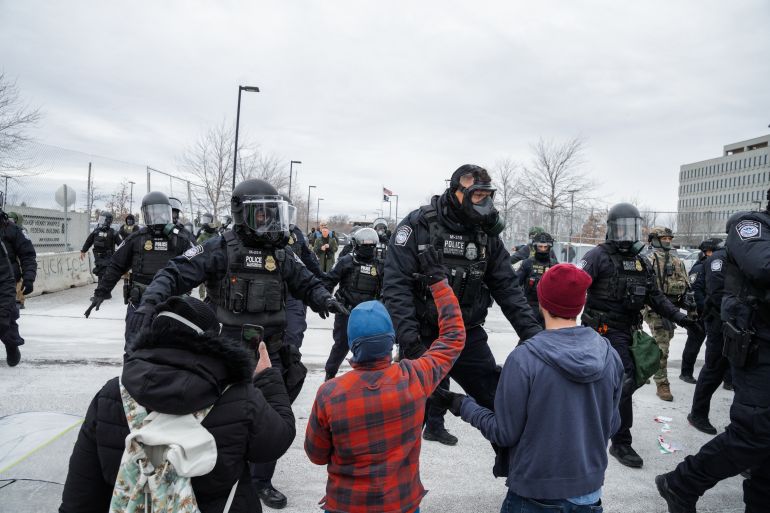
The Pentagon in the United States has ordered some 1,500 active duty soldiers in Alaska to be ready to be deployed to Minnesota, where large protests have been taking place against federal immigration raids, US media reported. Two unnamed officials told Reuters on Sunday that two infantry battalions from the Army’s 11th Airborne Division, which is based in Alaska and specialises in operating in arctic conditions, have been given prepare-to-deploy orders to the twin cities of Minneapolis and St Paul, where protests against raids by Immigration and Customs Enforcement (ICE) officers are continuing, despite freezing conditions. Recommended Stories list of 4 itemsend of list In a statement emailed to The Associated Press news agency, Pentagon chief spokesman Sean Parnell did not deny that the orders were issued and said the military “is always prepared to execute the orders of the Commander-in-Chief if called upon.” ABC News was the first to report the development. The news comes as widespread protests continue in the twin cities of Minneapolis and St Paul against violent tactics used by close to 3,000 federal ICE agents deployed to the city, following the shooting death of Minneapolis resident and mother Renee Nicole Good, 37. Multiple people have been injured as the raids continue, with ICE also reporting on Sunday that a man had died in ICE detention after being arrested in Minneapolis. Victor Manuel Diaz, a 36-year-old from Nicaragua, died in ICE custody at Camp East Montana in El Paso, Texas, on Sunday afternoon, 12 days after he was arrested in Minneapolis, ICE said in a statement. Advertisement The US Department of Homeland Security (DHS), which is also part of the federal operation in Minnesota, said that a federal officer shot a Venezuelan man in the leg on Wednesday as the immigration raids continued. The Minneapolis Fire Department also said that a six-month-old baby and a child were hospitalised on Wednesday after they sustained injuries from tear gas deployed by ICE agents, according to Minnesota Public Radio (MPR). ICE director Todd M Lyons said on Wednesday that US federal agents had arrested 2,500 people since starting their operation in Minnesota. However, human rights advocates and legal observers have expressed concerns about overcrowding and inhumane conditions in the country’s immigration detention facilities, as well as on deportation flights. Hundreds of Venezuelan men were deported to the Centre for the Confinement of Terrorism (CECOT) maximum security prison in El Salvador in March 2025. An expose on CECOT, which was reportedly delayed from airing on CBS News’s 60 Minutes programme last month, prompting backlash, went to air on Sunday night. Minneapolis police officers charge at people who kneel in front of them during an anti-ICE protest outside the Whipple Federal Building, in Fort Snelling, Minnesota, on January 15 [Plga Fedorova/EPA] Insurrection Act The potential deployment of troops to Minnesota comes after the Pentagon sent some 700 US Marines to Los Angeles in June and July in response to protests over aggressive immigration enforcement operations under way there, although the soldiers’ role was limited to guarding two federal properties in the greater Los Angeles area. At the time, Trump threatened to invoke the Insurrection Act, a law from 1807, to broaden the soldiers’ role, but ultimately did not do so. Trump has again threatened to invoke the Insurrection Act in recent days, this time in Minnesota, before appearing to walk back the threat a day later, telling reporters at the White House that there was not a reason to use it “right now”. “If I needed it, I’d use it,” Trump said. “It’s very powerful.” Minneapolis Mayor Jacob Frey on Sunday described the 3,000 ICE and border control agents waging Trump’s crackdown on undocumented immigrants as an “occupying force that has, quite literally, invaded our city”. “It’s ridiculous, but we will not be intimidated by the actions of this federal government,” Frey told CNN’s State of the Union on Sunday. “It is not fair, it’s not just, and it’s completely unconstitutional.” Thousands of Minneapolis citizens are exercising their First Amendment rights, and the protests have been peaceful, Frey said, referring to the section of the US Constitution that covers freedom of speech and the right to peacefully protest. Advertisement Governor Tim Walz has also mobilised the Minnesota National Guard, although no units have been deployed to the streets. Meanwhile, US Secretary of Homeland Security Kristi Noem has said that the crackdown will continue “until we are sure that all the dangerous people are picked up, brought to justice and then deported back to their home countries”. Adblock test (Why?)
European leaders slam Trump’s tariff threats over Greenland
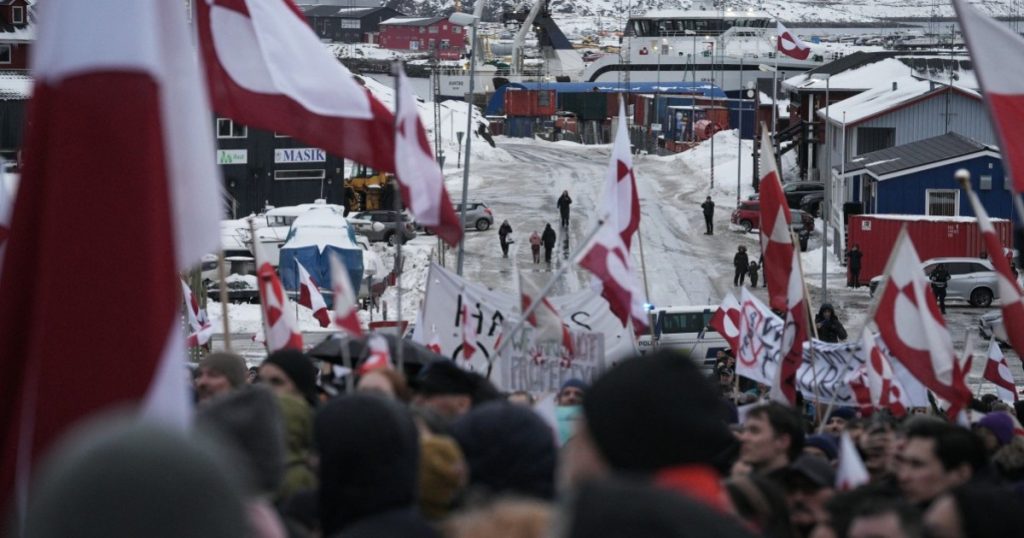
European leaders have condemned United States President Donald Trump’s threat to slap tariffs on countries that resist his bid to take over Greenland, warning the move risks a “dangerous downward spiral” in transatlantic ties. In a joint statement on Sunday, the eight countries targeted by Trump for new tariffs said they “stand in full solidarity” with Denmark and the people of Greenland, a semi-autonomous Danish territory. Recommended Stories list of 4 itemsend of list “Building on the process begun last week, we stand ready to engage in a dialogue based on the principles of sovereignty and territorial integrity that we stand firmly behind,” Denmark, Finland, France, Germany, the Netherlands, Norway, Sweden and the United Kingdom said in the statement. “Tariff threats undermine transatlantic relations and risk a dangerous downward spiral. We will continue to stand united and coordinated in our response. We are committed to upholding our sovereignty.” The rebuke came as European officials were preparing to hold emergency talks on coordinating a response to Trump’s escalating pressure campaign over the future of the vast island. European Council President Antonio Costa said on Sunday that the bloc was united in upholding national sovereignty and to “defend ourselves against any form of coercion” ahead of a planned extraordinary meeting of member states in the coming days. European officials are expected to discuss a range of options for responding to Trump’s economic threats, including retaliatory tariffs and market restrictions for US firms. Advertisement Trump announced on Saturday that the eight countries would face a 10 percent tariff from February 1, rising to 25 percent from June 1, until a deal is reached for the US to buy Greenland. The Financial Times reported that the bloc was considering imposing 93 billion euros ($108bn) worth of tariffs on US goods as well as activating the Anti-Coercion Instrument, commonly known as the “trade bazooka”, adopted by the bloc in 2023. The mechanism, which has never been used, allows for sweeping restrictions on investments and the withdrawal of intellectual property protections for foreign firms in the bloc. “The Anti-Coercion Instrument (ACI), designed precisely for such cases, must now be used,” German MEP Bernd Lange, who chairs the European Parliament’s trade committee, said in a post on X. “I call on the European Commission to activate it immediately.” Trump’s insistence on controlling Greenland has plunged US-European relations to their lowest point in decades, prompting fears for the survival of NATO. Trump, who has not ruled out the use of military force to seize the territory, has brushed aside concerns about splitting the 32-member transatlantic alliance, which is built on the principle that an armed attack against any one member is considered an attack against all. Trump reiterated his determination for the US to take ownership of Greenland in a social media post early on Monday, claiming that Denmark had been “unable to do anything” about Russian threats to the territory. “Now it is time, and it will be done!!!” Trump said on Truth Social. Denmark has ruled out selling Greenland, and opinion polls suggest the vast majority of the island’s 57,000 residents do not wish to be part of the US. On Saturday, thousands of protesters took to the streets of Danish cities to rally against Trump’s threats, chanting “Greenland is not for sale” and holding banners with slogans such as “Hands off Greenland”. Danish Prime Minister Mette Frederiksen on Sunday expressed appreciation for the “strong support” being offered to her country. “We want to cooperate, and it is not us who are seeking conflict. And I am pleased by the consistent messages from the rest of the continent: Europe will not be blackmailed,” Frederiksen said in a statement on social media. French President Emmanuel Macron said that “no intimidation or threat” would influence his government’s position on Greenland. “Tariff threats are unacceptable and have no place in this context,” Macron said on social media. “Europeans will respond in a united and coordinated manner should they be confirmed. We will ensure that European sovereignty is upheld.” Advertisement UK Prime Minister Keir Starmer called Trump’s planned tariffs “completely wrong”. “We will of course be pursuing this directly with the US administration,” he said on social media. Adblock test (Why?)
China says GDP grew 5% in 2025, among weakest expansions in decades
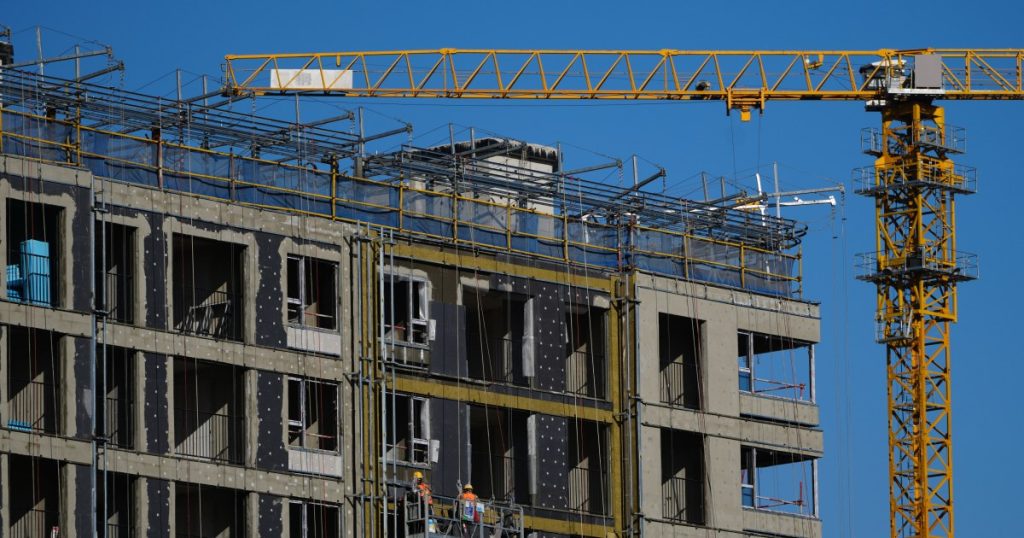
BREAKINGBREAKING, The world’s second-largest economy grew 4.5 percent in the final quarter, data shows. China’s economy grew 5 percent in 2025, hitting Beijing’s annual target even as it registered one of the weakest expansions in decades, according to official statistics. The Chinese economy grew in line with official expectations despite US President Donald Trump’s trade war, official data showed on Monday, as surging exports helped offset weak consumer spending and a prolonged property downturn. Still, despite shrugging off Trump’s tariffs, growth was still well below the recent historical trend of about 8 percent between 2000 and 2025. The world’s second-largest economy slowed to annualised growth of 4.5 percent in the October-December period, compared with expansions of 4.8 percent year and 5.2 percent, respectively, in the third and second quarters. “Generally speaking, the national economy sustained momentum of steady progress in 2025 despite multiple pressures, and high-quality development registered new achievements,” China’s National Bureau of Statistics said in a statement. “However, we must be aware that the impact of changes in the external environment is growing, the contradiction of strong supply and weak demand in the domestic market is prominent, and the numerous longstanding issues and new challenges still remain in the economic development.” Exports drove the Chinese economy’s expansion, with their total value raising 6.1 percent to 26,989 billion yuan, according to the data. China’s trade surplus reached a record high of nearly $1.2 trillion last year, according to official data, as Chinese firms sought out new markets in Asia, Africa, Latin America and Europe to mitigate the fallout of Trump’s tariffs. Advertisement Consumption and real estate, both persistent drags on China’s economy in recent years, continued to weigh on growth. Retail sales grew 0.9 percent on a yearly basis in December, the slowest gain since Beijing lifted its ultra-strict COVID-19 controls in late 2022, according to the figures. Fixed-asset investment fell 3.8 percent across the year, with spending on infrastructure and real estate development declining by 2.2 percent and 17.2 percent, respectively. “Today’s GDP read shows that it’s mission accomplished for 2025, as China managed to complete its growth target of around 5 percent,” Lynn Song, chief economist for Greater China, told Al Jazeera. “However, growth clearly decelerated in the second half of the year, and now the focus shifts to how to achieve another year of solid growth in 2026 to get the 15th five-year period off to a strong start,” Song added, referring to Beijing’s five-year plan for 2026-2030. Adblock test (Why?)
Trump’s ‘board of peace’ appears to seek wider mandate beyond Gaza
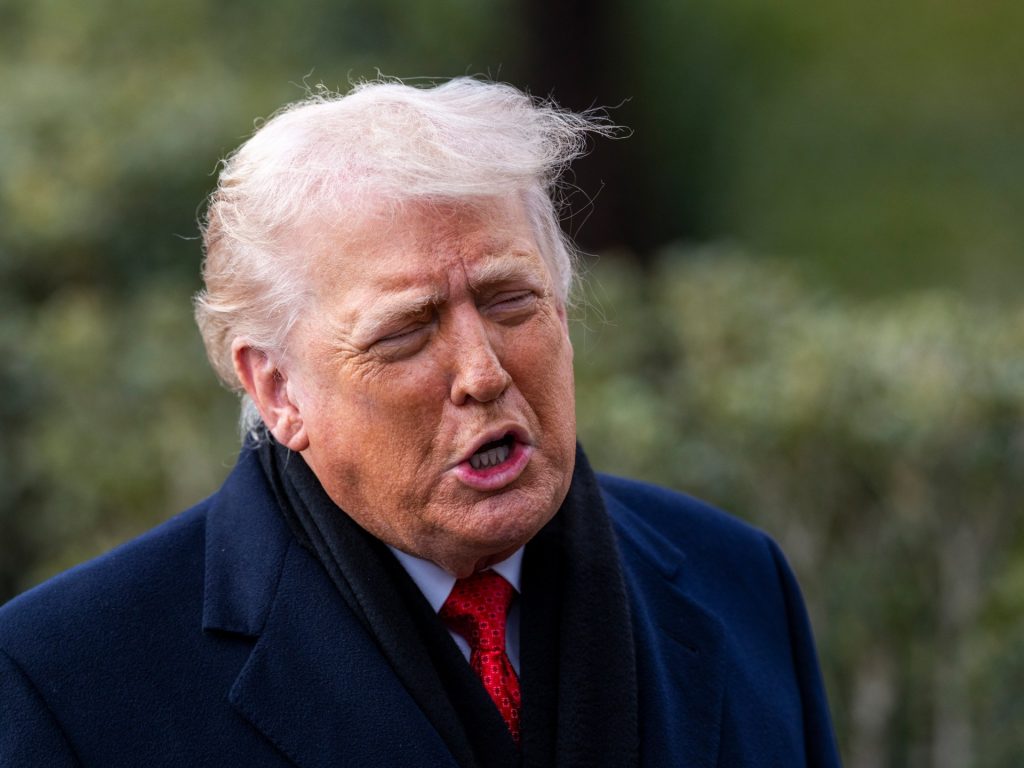
United States President Donald Trump has begun to invite world leaders and other prominent figures to be part of his so-called “board of peace“, reportedly outlining a wider vision for a long-term body that responds to global conflicts beyond Gaza. Trump had initially unveiled the board as part of phase two of a ceasefire agreement between Israel and Hamas to end Israel’s genocidal war on Gaza, envisioning that the body would oversee “governance capacity-building, regional relations, reconstruction, investment attraction, large-scale funding, and capital mobilisation” in the enclave. Recommended Stories list of 3 itemsend of list But letters written by Trump, which were posted to social media on Saturday by two leaders invited to be part of the board – Argentinian President Javier Milei and Paraguay’s leader, Santiago Pena – pointed to wider ambitions. A so-called “charter” that accompanied the letter also pointed to loftier goals, according to several reports. In Trump’s letter to Milei, the US president said the board would seek to “solidify Peace in the Middle East”, adding that it would “embark on a bold new approach to resolving Global Conflict” at the same time. The Financial Times, meanwhile, quoted the accompanying “charter” as saying that “the Board of Peace is an international organisation that seeks to promote stability, restore dependable and lawful governance, and secure enduring peace in areas affected or threatened by conflict”. “Durable peace requires pragmatic judgment, common sense solutions, and the courage to depart from approaches and institutions that have too often failed,” said the charter, which did not directly reference Gaza, according to the newspaper. Advertisement Two diplomatic sources also told the Reuters news agency that the invitations included a “charter” that outlined a wider mandate for the body. “It’s a ‘Trump United Nations’ that ignores the fundamentals of the UN charter,” one diplomat aware of the letter told the news agency, A senior US official, meanwhile, told The Associated Press news agency that an expanded role for the board of peace remains “aspirational”. The official added that Trump and his advisers believe such a role is possible, particularly as Washington and other UN members have repeatedly expressed frustration with the international organisation. However, the official said the board of peace was not intended to replace the UN. Gaza focus To be sure, the Trump administration has so far publicly said that the board of peace will initially focus on Gaza. On Friday, Trump announced that Tony Blair, the United Kingdom’s former prime minister, would be among the board’s founding executive members, alongside Trump’s son-in-law, Jared Kushner, US Secretary of State Marco Rubio and the US special envoy to the Middle East, Steve Witkoff. Also initially announced were Marc Rowan, the CEO of Apollo Global Management, World Bank Group President Ajay Banga, and Robert Gabriel, a US deputy national security adviser. Many of those figures were also named to a separate “Gaza executive board”, which is set to oversee a technocratic committee of Palestinians, named the National Committee for the Administration of Gaza (NCAG). The committee is expected to handle day-to-day governance in Gaza in lieu of Hamas. The 11-member executive board includes Blair, Kushner and Witkoff, as well as Turkish Minister of Foreign Affairs Hakan Fidan, Qatari diplomat Ali Al Thawadi, UN Middle East peace coordinator Sigrid Kaag, United Arab Emirates Minister of State for International Cooperation Reem Al-Hashimy, and Israeli-Cypriot billionaire Yakir Gabay. Beyond Argentina’s Milei and Pena, Turkiye and Egypt have confirmed their respective leaders, Recep Tayyip Erdogan and Abdel Fattah el-Sisi, have been invited to join the wider board of peace. A European Union official said that European Commission President Ursula von der Leyen had also been invited to represent the EU. Four sources told Reuters that the leaders of France, Germany, Australia and Canada were also invited to sit on the board, although there was no official confirmation. The White House said it would announce more members in the coming weeks. Still, the initial announcement of board members sparked outrage among many in the Middle East for not including any Palestinians, but instead elevating staunch supporters of Israel. Advertisement Israeli Prime Minister Benjamin Netanyahu, meanwhile, raised opposition to the Gaza executive board on Saturday, saying its composition “was not coordinated with Israel and runs contrary to its policy”. A statement from Netanyahu’s office did not specify what exactly it opposed about the board’s makeup. Adblock test (Why?)
Military leader Doumbouya sworn in as Guinea’s president
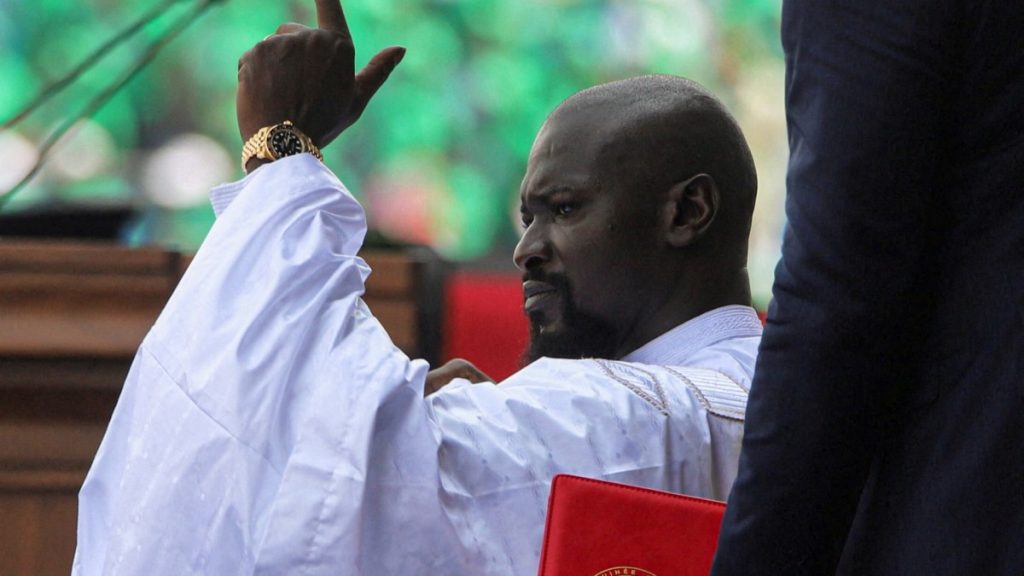
Doumbouya was declared victor in the West African country’s first election since he led the 2021 military takeover. By News Agencies Published On 18 Jan 202618 Jan 2026 Click here to share on social media share2 Share Mamady Doumbouya, a general who led a 2021 military takeover in Guinea, has been sworn in as the West African country’s president. The Saturday event, which took place in front of tens of thousands of supporters and several heads of state, came after Doumbaya was declared the victor in last month’s election. Recommended Stories list of 3 itemsend of list The vote was the first since Doumbouya toppled President Alpha Conde four years ago. Although he initially pledged not to run for president after seizing power, Doumbouya ultimately stood for election against eight other candidates. However, his most prominent opponents remained in exile, with the opposition calling for a boycott of the poll. The West African country’s Supreme Court later said Doumbouya received 86.7 percent of the vote. Dressed in a traditional gown, Doumbouya swore an oath to uphold the constitution – which had recently been altered to allow him to stand – during an hours-long ceremony at the General Lansana Conte Stadium on the outskirts of the capital, Conakry. “I swear before God and before the people of Guinea, on my honour, to respect and faithfully enforce the Constitution, the laws, regulations and judicial decisions,” he said. Heads of state from Rwanda, The Gambia, Senegal and other African countries joined the event, as did the vice presidents of China, Nigeria, Ghana and Equatorial Guinea, as well as officials from France and the United States. Assimi Goita, a general who has led neighbouring Mali since a military takeover in 2020, was also in attendance. Advertisement The election came after Guineans approved a new constitution in September that permitted members of the military leadership to run for office. It also lengthened presidential terms from five to seven years, setting a two-term limit. Doumbouya has said the military takeover was justified due to alleged corruption and economic mismanagement under Conde, who in 2010 became the country’s first freely elected president since its 1958 independence. During four years in power, the military dissolved state institutions and suspended the constitution, as it negotiated with regional bodies, including the Economic Community of West African States (ECOWAS), over a return to democratic civilian government. Doumbouya has cracked down on civil liberties, banned protests and targeted political opponents during his time as leader. With about 52 percent of the population living in poverty, he has promised to tap the country’s vast natural resources, which include untapped iron ore deposits, as well as the world’s largest bauxite reserves. Adblock test (Why?)
Guatemala prisoners take workers hostages in riots across three facilities
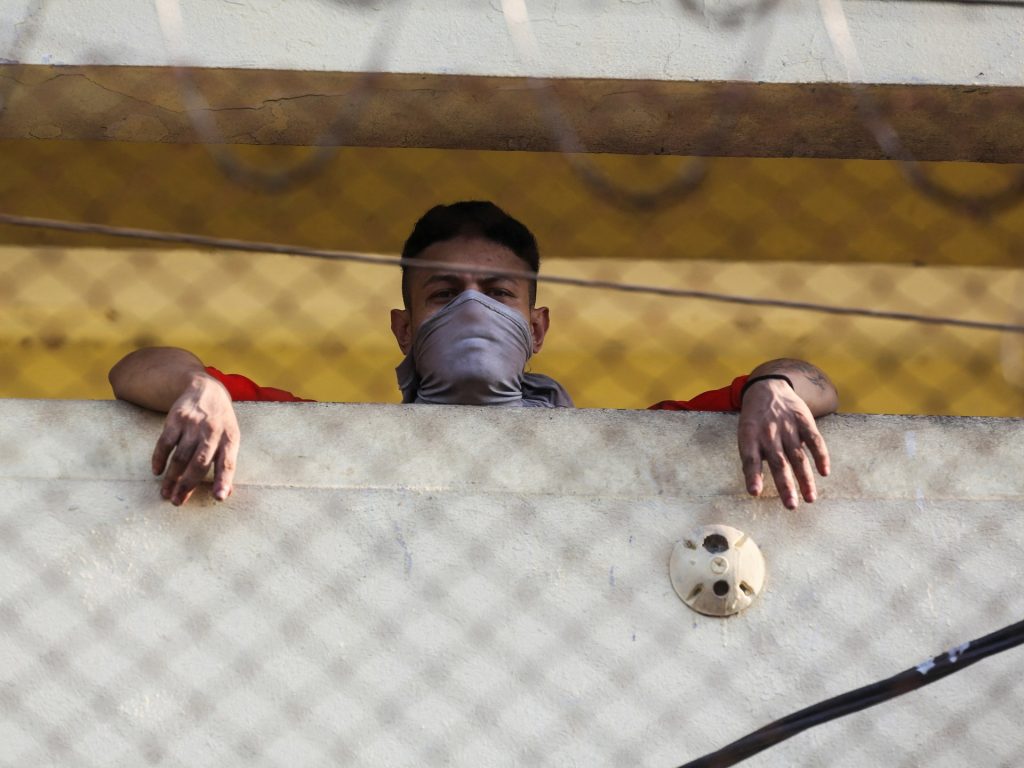
Officials say 46 workers are being held, with gang members behind the riots seeking better conditions. By News Agencies Published On 18 Jan 202618 Jan 2026 Click here to share on social media share2 Share Prisoners in Guatemala have taken at least 46 workers hostage in riots across three detention centres, according to authorities. Officials said the incidents, which began on Saturday, appeared to be coordinated by gang members in response to their leader seeking a transfer to another facility for better conditions. Recommended Stories list of 3 itemsend of list There were no reported deaths or injuries among the hostages, Interior Minister Marco Antonio Villeda said at a news conference. Villeda said those behind the riots were members of the Barrio 18 gang, while the Interior Ministry described the unrest as a “direct reaction” to its moves to revoke privileges from gang leaders. “I am not going to make any deals with any terrorist group. I will not give in to this blackmail, and I will not restore their privileges in exchange for them stopping their actions,” Villeda said. The hostages are mostly guards, but also include a psychologist, a prison official said. At the Renovacion 1 maximum security prison in Escuintla in Guatemala’s south, police and soldiers formed a perimeter around the prison, as ambulances and firetrucks were standing by to intervene if necessary. Inmates, some wearing jumpsuits but most in tank tops and shorts, their faces covered by masks improvised with pieces of clothing, watched from above, perched in the prison’s patrol towers. One masked inmate, speaking from behind barbed wire, said they were not safe at the prison and were demanding to be moved. “They can’t even guarantee their own security, so how are they supposed to guarantee ours?” he said, referring to prison authorities. Guatemala has struggled to control its prison population in recent years amid rampant gang influence. Inmates, meanwhile, have reported harsh and dangerous conditions. Advertisement In October, President Bernardo Arévalo accepted the resignations of three top security officials after 20 gang members escaped over a period of days. “The link between the prison system and the criminality outside has to be cut,” Arevalo said in an interview with The Associated Press news agency earlier this week. “That’s why all this effort to regain control of the prison system is very important.” Adblock test (Why?)
Trump asks Turkiye’s Erdogan, Egypt’s el-Sisi to join Gaza ‘board of peace’
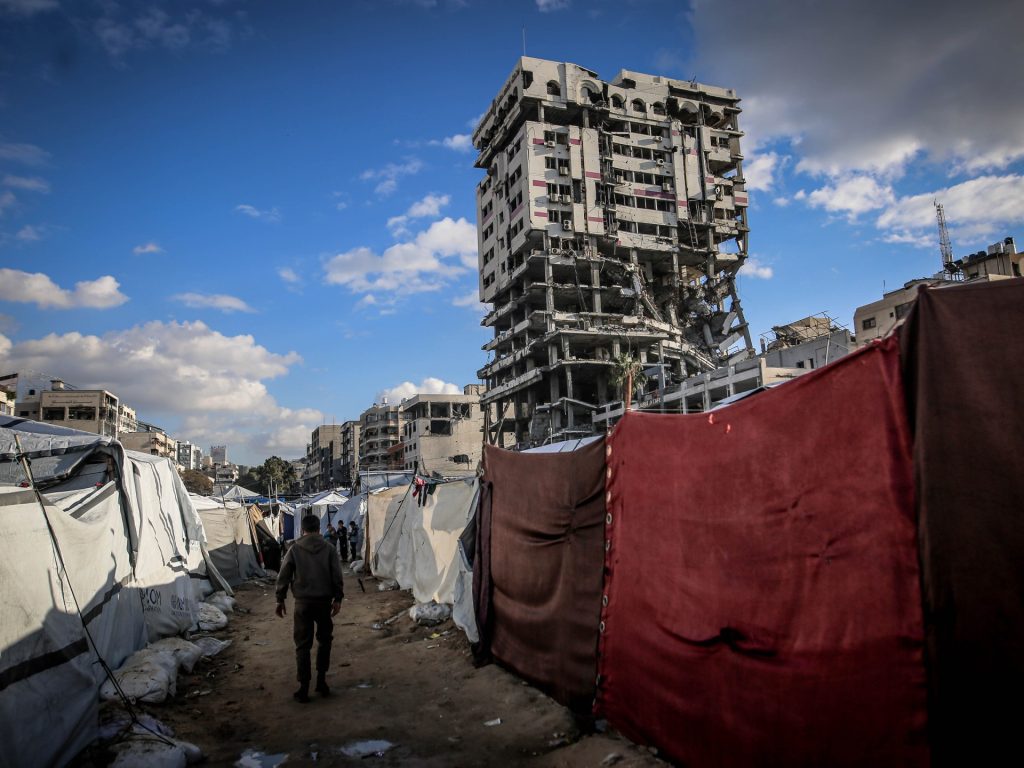
United States President Donald Trump has invited the leaders of Egypt and Turkiye to join his “board of peace” to oversee the post-war transition in Gaza, according to authorities in Ankara and Cairo. The so-called board of peace revealed by the White House on Friday will oversee the temporary governance of Gaza under the US president’s plan to end Israel’s genocidal war against Palestinians in the besieged territory. Recommended Stories list of 4 itemsend of list Turkish President Recep Tayyip Erdogan received the proposal in a letter sent on Friday by Trump inviting him to “become a founding member” of the board, Turkish presidential communications director Burhanettin Duran posted on social media on Saturday. Meanwhile, Egypt’s foreign minister, Badr Abdelatty, said at a news conference on Saturday that the country was reviewing a separate invitation from Trump to Egyptian President Abdel Fattah el-Sisi to join the board. The White House on Friday announced several members of the board, including US Secretary of State Marco Rubio, President Donald Trump’s special envoy Steve Witkoff, former British Prime Minister Tony Blair, and Trump’s son-in-law, Jared Kushner. Trump is to chair the board. The establishment of the board was part of Trump’s plan to end Israel’s war on Gaza that was unveiled in October. The plan says a Palestinian technocratic body will be overseen by the international board, which will supervise Gaza’s governance for a transitional period. Many rights experts and advocates have said that Trump overseeing a board to supervise a foreign territory’s governance resembled a colonial structure, while the prospect of Blair’s involvement was criticised last year due to his role in the Iraq war and the history of British imperialism in the Middle East. Advertisement Reporting from Gaza City on Saturday, Al Jazeera’s Hani Mahmoud said Palestinians in the war-ravaged territory have noted that many of the people named to the “board of peace” have been major supporters of Israel and its war on the Gaza Strip. He said the major concern among Palestinians in Gaza is that the board members could prioritise “dominance [and] control over justice, reconstruction and the self-determination of the Palestinian people”. Mahmoud added that, if Palestinians had a voice on the board, they would demand safety first and foremost. “They want to live their day without the sounds of drones, … without sudden air strikes and forced displacement,” he said. The White House did not detail the responsibilities of each member of the “founding executive board”. It said more members will be announced over the coming weeks. The board will also include private equity executive and billionaire Marc Rowan, World Bank President Ajay Banga and Robert Gabriel, a Trump adviser, the White House said, adding that Nickolay Mladenov, a former United Nations Middle East envoy, will be the high representative for Gaza. Army Major-General Jasper Jeffers, a US special operations commander, was appointed commander of the international stabilisation force, the White House said. Gaza force authorised A UN Security Council resolution, adopted in mid-November, authorised the board and countries working with it to establish that force in Gaza. The White House also named an 11-member “Gaza executive board” that will include Turkish Foreign Minister Hakan Fidan, the UN special coordinator for the Middle East peace process, Sigrid Kaag, the United Arab Emirates minister for international cooperation, Reem al-Hashimy, and Israeli-Cypriot billionaire Yakir Gabay, along with some members of the executive board. This additional board will support Mladenov’s office and the Palestinian technocratic body, whose details were announced this week, the White House said. A tenuous ceasefire has been in effect in Gaza since October, but Israel has repeatedly breached the truce, killing more than 450 Palestinians, including more than 100 children. Three Israeli soldiers have been killed in attacks by Palestinian armed groups. At least 71,548 people have been killed and 171,353 wounded by Israeli forces across Gaza since October 2023. A total of 1,139 people were killed in Israel during the October 7, 2023, attacks, and about 200 were taken captive. Multiple rights experts, scholars and a UN inquiry say this amounts to genocide. Adblock test (Why?)
Thousands join ‘Hands off Greenland’ protests amid Trump’s takeover threats
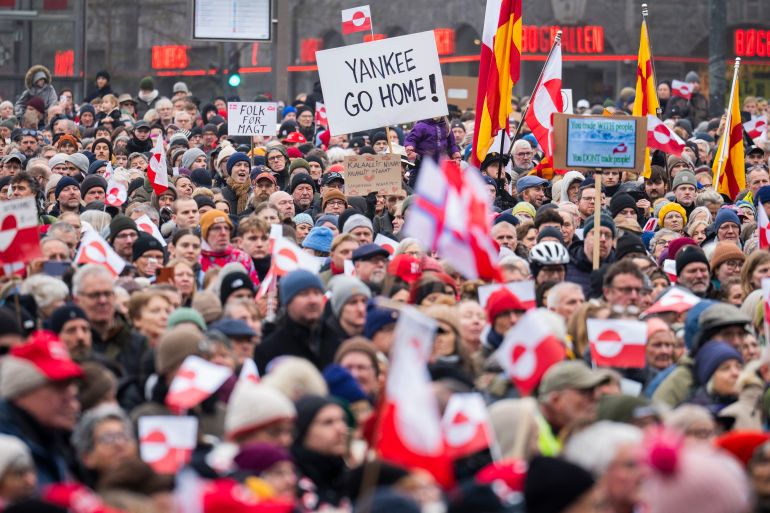
Thousands of protesters have taken to the streets of Denmark to show support for Greenland and reject United States President Donald Trump’s repeated threats to take control of the self-governing Danish territory. Waving the flags of Denmark and Greenland, the protesters formed a sea of red and white outside Copenhagen city hall on Saturday, chanting “Kalaallit Nunaat” – the Arctic island’s name in Greenlandic. Recommended Stories list of 3 itemsend of list Rallies were also organised throughout the day in the Danish cities of Aarhus, Aalborg and Odense, as well as in Greenland’s capital, Nuuk. “I am very grateful for the huge support we as Greenlanders receive … We are also sending a message to the world that you all must wake up,” said Julie Rademacher, chair of Uagut, an organisation for Greenlanders in Denmark. “Greenland and the Greenlanders have involuntarily become the front in the fight for democracy and human rights,” she added. The demonstrations come as Trump said 10 percent tariffs would be imposed on several European allies opposing US control of Greenland from February 1, hitting Denmark, Finland, France, Germany, Norway, Sweden, the Netherlands and the United Kingdom. The US president, who says the move is critical for his country’s interests, added those tariffs would rise to 25 percent on June 1 and would continue until an agreement is reached for the US to purchase Greenland. Protesters rally in support of Greenland in the Danish capital, Copenhagen, on January 17, 2026 [Martin Sylvest Andersen/Getty Images] While Greenland and Denmark have rejected the idea of the island being “owned” by the US, efforts to get the US administration to change its stance have so far appeared to fail. Advertisement The foreign ministers of Denmark and Greenland left a meeting with US Secretary of State Marco Rubio in Washington, DC, this week, saying that they “didn’t manage to change the American position”. “It’s clear that the president has this wish of conquering over Greenland,” Danish Foreign Minister Lars Lokke Rasmussen told reporters. According to the latest poll published in January of last year, 85 percent of Greenlanders oppose the territory joining the US, while only 6 percent were in favour. Reporting from Nuuk, the Greenlandic capital, Al Jazeera’s Rory Challands said Saturday’s rally is expected to be a large one. “This is … the capital city, but [home to] only about 19-20,000 people. Everyone we spoke to yesterday said that they were going to be coming out and marching today,” Challands said. “This essentially is Danes and Greenlanders coming together. Everyone here believes that at some point, there should be some form of independence [for Greenland],” he added. “But for the moment, Denmark and Greenland are saying that their best way out of this crisis is to remain united.” Some US lawmakers – including members of Trump’s own Republican Party – also have raised opposition to the president’s push to take control of Greenland, saying it threatens global stability and the US commitment to NATO. A bipartisan group of US Congress members travelled to Denmark on Friday, led by Democratic Senator Chris Coons, who said there was no security threat to Greenland to justify the Trump administration’s stance. “Greenland is a part of Denmark. Denmark is our NATO ally. That should be the end of this discussion, in my view,” Coons told reporters in Copenhagen. Trump has repeatedly accused Denmark of failing to do enough to secure Greenland’s territorial waters in the Arctic. European NATO members are deploying troops in Greenland for a military exercise designed to show that they will “defend [their] sovereignty”, French armed forces minister Alice Rufo said this week. Britain, Finland, France, Germany, the Netherlands, Norway and Sweden have announced they are sending small numbers of military personnel to prepare for future exercises in the Arctic. Adblock test (Why?)
Senegal hope Morocco final will not be Mane’s AFCON farewell
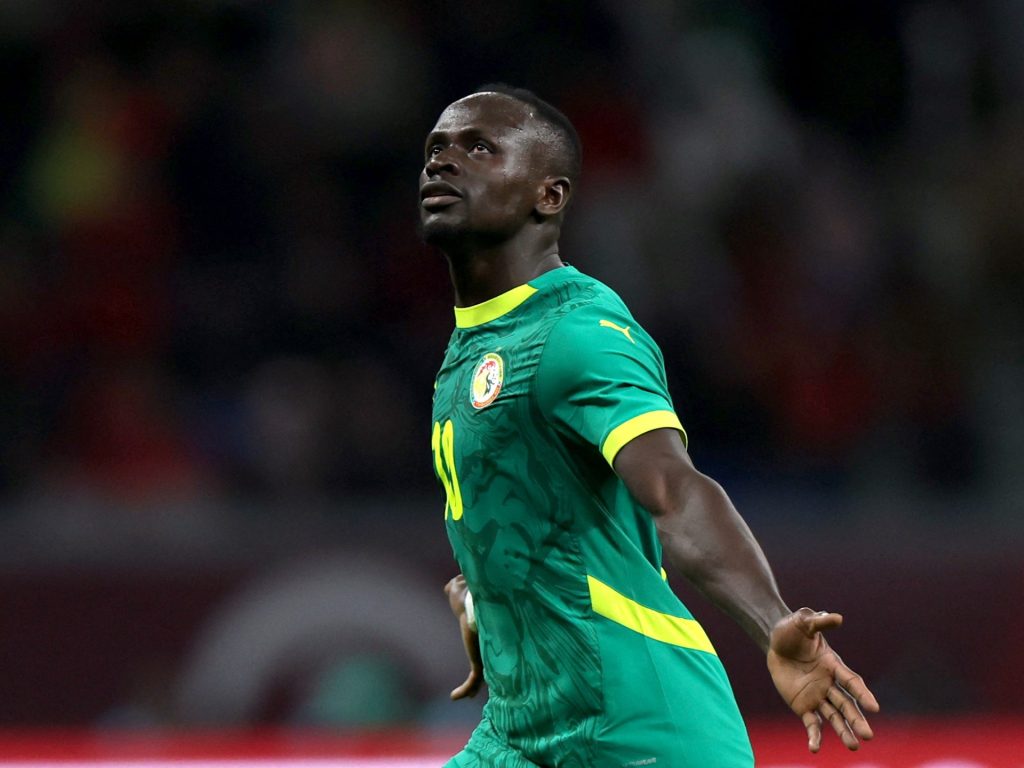
Former Liverpool forward Sadio Mane announced after the semifinal that he would not appear at another AFCON for Senegal. Senegal coach Pape Thiaw says he hoped the Africa Cup of Nations final against Morocco would not be Sadio Mane’s last game at the tournament, insisting the former Liverpool forward could reconsider walking away from the team. “His decision is no longer up to him. There is a whole people behind him, too, and they would like to see him continue,” Thiaw told reporters in Rabat on the eve of the final against the host nation. Recommended Stories list of 4 itemsend of list Mane, 33, said after Wednesday’s semifinal against Egypt, in which he scored the winner, that he would not play at another AFCON. His comments indicated that he may retire from international football altogether following the World Cup in North America in June and July, by which time he will be 34. The next Cup of Nations is due to take place in 2027 in Kenya, Tanzania and Uganda, while the 2029 edition is being brought forward to 2028. “I think he made his decision in the heat of the moment and the country does not agree, and I, as coach of the national team, do not agree at all,” said Thiaw. “We would like to keep him for as long as possible.” Mane helped Senegal win the Cup of Nations for the first time in their history in 2022, scoring the winning penalty in the shootout in the final against Egypt. The two-time winner of the African player of the year prize also played in the side that lost the 2019 final to Algeria – Sunday’s match will be Senegal’s third final in four editions of AFCON. “Sadio is an exceptional player who would have deserved to win a Ballon d’Or. Above all, he is just an incredible man,” said defender Moussa Niakhate. Advertisement “He doesn’t have a big ego. He just works hard and loves his country – the fact this is his sixth AFCON shows his longevity and consistency.” Thiaw reiterates Senegal’s AFCON complaint against Morocco Meanwhile, the Senegal coach expressed anger at the welcome his team received on arriving in the Moroccan capital on Friday. The Lions of Teranga travelled to Rabat, having been based in the northern port city of Tangiers since the start of the competition. The Senegalese Football Federation released a statement early on Saturday complaining about “serious concerns” including a “lack of adequate security” for the team’s arrival “which put the players and staff at risk”. It also complained about the hotel offered to the delegation, about the number of tickets given to their supporters for the final, and said they were not happy at being offered a training pitch at the Moroccan team’s base. “What happened yesterday was not normal,” insisted Thiaw. “Given the number there, anything could have happened. My players could have been in danger. “That type of thing should not happen between two brother countries.” Morocco ready for ‘hardest’ step against Senegal The final brings together the top two teams in Africa according to the FIFA rankings, with Morocco hoping to make the most of home advantage to take the AFCON title for the first time in 50 years. There is, however, enormous pressure on the 2022 World Cup semifinalists to take the trophy. “We dreamt of being here and now we are, but the last step will be the hardest one,” said Morocco coach Walid Regragui. “Senegal are a great side and this is their third final out of four, but it is great for African football to have a final between the two best teams.” He added: “How we handle the emotion of the occasion will be important. We can’t put too much pressure on ourselves. “The final is 50/50 but maybe it will be 51 percent in our favour with the crowd behind us.” Adblock test (Why?)

